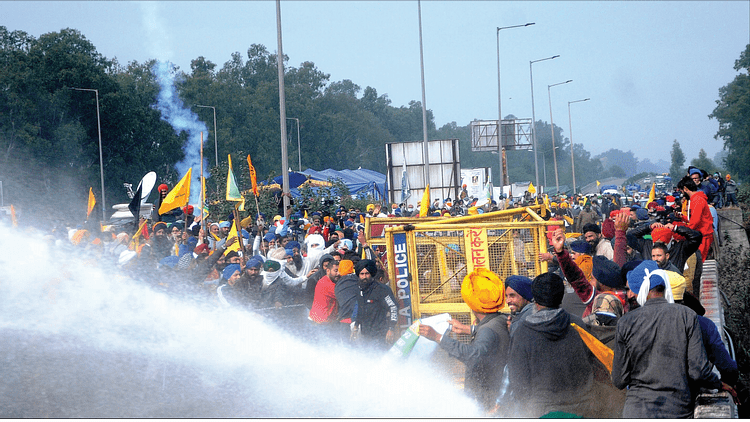They are also suspicious of contract farming. The contracts will be voluminous and in English, they point out. The fine print will escape most of them. “So, we get into a contract to sell our produce at a certain price even before we start cultivating. If the crop fails for lack of rains, we will fail to deliver on the agreement. But if we produce a bumper crop, the companies can always find fault with the grain (too moist, too black, too broken, too small) and refuse to pay the agreed price,” explain a group. Farmers bear the brunt of both excess rain and drought, they suffer if they produce less and they also suffer when they produce more. Prices go up when crops fail but traders benefit from the price-rise. Prices go down when they produce bumper crops. In both cases, they suffer.
Farmers will not be able to take the companies to court for breach of promise or for arm-twisting farmers, they fear. “It is a win-win situation for them and a losing proposition for us,” adds Happy Singh.
The leaders are more vocal. When revolutionaries in Bengal began opposing the British, it was said that only Bengalis were opposed to colonial rule, recalls Yogendra Yadav. “They were fighting for country’s freedom but it was easy to label them. Similarly, Punjab’s farmers have waged a historic struggle on behalf of Indian farmers,” he tells an interviewer.
A quieter lot of farmers reflect that problems farmers face are different from one state to another. ‘One cap fits all’ approach of the Centre, they felt, would not work in a country like India. But there are also common grievances. Land, water and electricity are issues everywhere. And the govt’s track record has been dismal. The govt, farmers fear, is conspiring to end all subsidies on agriculture. Electricity tariff, which farmers get free in Punjab and at subsidized rates in many states, is all set to go up, they claimed. Water, storage and transportation are increasingly becoming expensive. And various laws are making it easier for industry, mining and commercial enterprises to take over farmland.
“We are neck deep in debt; our crops often do not fetch even the cost of production, our children do not have jobs, education and healthcare are now privatized and prohibitive…where do we go?” is a common refrain.
Here are good reasons for the trust deficit between govt and farmers. PM Narendra Modi has been claiming that farm laws had liberated farmers and they can now sell their produce anywhere in the country at prices of their choice. But farmers are quick to point out that both BJP-ruled UP and Haryana had been stopping grains from entering Punjab and Haryana. MP CM Shivraj Singh Chouhan also declared this week that MP would not allow grains from other states to enter it for sale.
The PM speaks of ‘one country, one market’ but his CMs speak in different voices and contradict him, say farmers. “How do we trust these people?”
The Agriculture Minister says that APMCs and Mandis will not be disturbed, a voice rings out from the back. “Why then has he abolished the taxes and fees charged by the Mandis?” The govt does seem to be contradicting itself. If taxes and fees can no longer be levied, then how do mandis sustain themselves? The structure is bound to collapse, a chorus of voices rise from the gathering.
The govt and BJP have badly burnt their fingers. Union ministers have said on record that they do not see too many farmers in the crowd. BJP trolls added to the sense of injury by derisively saying that ‘English speaking’ young men could not be farmers. Kangana Ranaut, the controversial actor who is a self-confessed Modi Bhakt, snidely tweeted that farmers were misguided and elderly women in the crowd could have been part of ‘rent a crowd’ for hundred rupees.
They only served to confirm what farmers have been articulating, that people in power have little under standing of farming and farmers. Their outrage is real. On Thursday evening as they impatiently waited for the leaders to return from talks in Vigyan Bhavan, they were animatedly discussing what the Haryana Agriculture Minister J P Dalal said in an interview. Foreign powers like Pakistan, which did not like the Indian PM, were instigating the farmers, he said.
The excited chatter is interrupted by someone raising his voice and the group falls silent to listen to him. He apparently informed the gathering of what the Karnataka Agriculture Minister B.C. Patil had reportedly said about farmer suicides. “Farmers who commit suicide are cowards. Only a coward who can’t take care of his wife and children commits suicide. When we have fallen (in the water), we have to swim and win,” Patil was quoted as saying.
“We gave the govt a two-month notice that we would be marching to Delhi. They ignored us. More than a month ago the Joint Committee (Morcha) of farmers applied for the use of Ramleela Ground in Delhi for our peaceful protest. They again ignored us. What do we do?” someone shouts. Several voices rise at once to question why Haryana Government and police dug up roads, built trenches, dumped sand and soil on the roads to stop the movement; why water cannons and tear gas were used on them, why they were caned…
Nobody denies farmers are in distress. Even the NCRB, the govt’s own public data bank, acknowledges that over 20,000 farmers and farm labourers committed suicide in 2018 and 2019. Farmers’ indebtedness is high and insurance schemes have helped farmers less and insurance companies more.
In 2016, the average age of an Indian farmer was 50.1 years, according to the Input Survey 2011-12 (released in 2016) by the Union Ministry of Agriculture and Farmers’ Welfare. And while this generation of farmers is approaching retirement, the next generation is not ready to take up farming because of low incomes. It is hardly surprising because the Economic Survey of 2016 also records that in 17 states of India, the average annual income of farmers was Rs 20,000.
A majority of students graduating from agricultural universities switch to other professions. Only 1.2 per cent of 30,000 rural youth surveyed by non-profit organization Pratham for its 2017 Annual Status of Education Report aspired to be farmers. While 18 per cent boys preferred to join Army, 12 per cent wanted to become engineers. Similarly, for girls, who play a major role in traditional farming, 25 per cent wanted to be teachers.
The percentage of students in agricultural or veterinary courses around India amounted to less than half a per cent of all undergraduate enrollments, the report found, raising questions about the future of agriculture and about who will produce food for the millions.
The farm laws are seen as perverse. It is fine to argue that 50% of the population contributing just 15% of the GDP is unviable and makes no economic sense. It is also fine to plan to move people away from agriculture. But with no jobs in a shrinking economy and the govt so bankrupt that it is unable to fulfil its legal obligation to the states, the laws couldn’t have come at a worse time.
It is a political turning point because by forcing the govt to blink, farmers have sent out the message that arbitrary decision-making can be challenged and reversed. Farmers as a political force and constituency are expected to increasingly call the shots. And the movement has succeeded in making people finally sit up and take notice



























































































